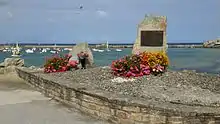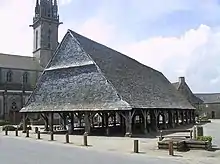Plouescat
Ploueskad | |
|---|---|
 The sea shore near Plouescat | |
 Coat of arms | |
Location of Plouescat | |
 Plouescat  Plouescat | |
| Coordinates: 48°39′28″N 4°10′24″W / 48.6578°N 4.1733°W | |
| Country | France |
| Region | Brittany |
| Department | Finistère |
| Arrondissement | Morlaix |
| Canton | Saint-Pol-de-Léon |
| Intercommunality | Haut-Léon Communauté |
| Government | |
| • Mayor (2020–2026) | Eric Le Bour[1] |
| Area 1 | 14.79 km2 (5.71 sq mi) |
| Population | 3,528 |
| • Density | 240/km2 (620/sq mi) |
| Time zone | UTC+01:00 (CET) |
| • Summer (DST) | UTC+02:00 (CEST) |
| INSEE/Postal code | 29185 /29430 |
| Elevation | 0–56 m (0–184 ft) |
| 1 French Land Register data, which excludes lakes, ponds, glaciers > 1 km2 (0.386 sq mi or 247 acres) and river estuaries. | |
Plouescat (French pronunciation: [pluɛskat]; Breton: Ploueskad) is a commune in the Finistère department of Brittany in north-western France. It is a seaside resort, complete with a casino and a large camping and caravanning site, adjacent to its extensive beach of fine, powdery sand. The region is largely agricultural, specialising in artichokes, onions, cauliflowers and potatoes.
Geography
Plouescat (Ploueskad), capital of the canton, is part of the district of Morlaix. It is a town in northern Finistère (Penn-ar-Bed), located on the edge of the English Channel, in the country of Léon, on the "Côte des Sables", on the edge of the "Côte des Légendes".
It is separated from Plounévez-Lochrist (Gwinevez) by the Keralle, a small coastal river which rises in Saint-Vougay and flows into the Baie du Kernic, in Pont-Christ en Plouescat; to the east, the town borders Cléder.
The communal finage forms, at least in its western part, a peninsula limited to the north by the English Channel and by Anse du Kernite the south; its western peak lies at Porz Meur.
Population

Inhabitants of Plouescat are called in French Plouescatais.
|
| ||||||||||||||||||||||||||||||||||||||||||||||||||||||||||||||||||||||||||||||||||||||||||||||||||||||||||||||||||
| Source: EHESS[3] and INSEE (1968-2017)[4] | |||||||||||||||||||||||||||||||||||||||||||||||||||||||||||||||||||||||||||||||||||||||||||||||||||||||||||||||||||
Breton language
In 2008, 17.02% of primary-school children attended bilingual schools.[5]
Sights

In the centre of the village is Les Halles - a remarkable timber-framed market hall dating from the early 15th Century which has been classified by the French Ministry of Culture as a Monument historique since 1915.[6]
The route of a former railway line provided the foundation for a new road, called Le boulevard de l'Europe, which by-passes Plouescat on its southern side.
International relations
Plouescat is twinned with:
See also
- Communes of the Finistère department
- Hortense Clémentine Tanvet Sculptor of war memorial
References
- ↑ "Répertoire national des élus: les maires". data.gouv.fr, Plateforme ouverte des données publiques françaises (in French). 9 August 2021.
- ↑ "Populations légales 2021". The National Institute of Statistics and Economic Studies. 28 December 2023.
- ↑ Des villages de Cassini aux communes d'aujourd'hui: Commune data sheet Plouescat, EHESS (in French).
- ↑ Population en historique depuis 1968, INSEE
- ↑ (in French) Ofis ar Brezhoneg: Enseignement bilingue
- ↑ Base Mérimée: IA00006409, Ministère français de la Culture. (in French)
External links
- Official website (in French)
- Base Mérimée: Search for heritage in the commune, Ministère français de la Culture. (in French)
- Mayors of Finistère Association (in French)